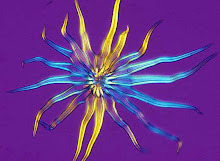Monday, July 28, 2014
White poppy
I found this white corn poppy Papaver rhoeas on the edge of a barley field near Egglestone in Teesdale last week. It's undoubtedly a genetic mutation that has prevented scarlet pigment formation in the petals but, oddly, not in the stamen filaments.
It was a similar mutation, that produced pale petal edges, found by Reverend William Wilks near his rectory garden at Shirley near Croydon in 1880, that led to his breeding of the famous Shirley poppies - a strain that's still on sale in garden centres.
Scarlet corn poppies have become a symbol of remembrance of the sacrifice and senseless slaughter in wars since the end of World War 1. White poppies were adopted by the pacifist movement, in remembrance of the dead and as part of the No More Wars movement, in the 1920s, as a symbol of peace.
Labels:
corn poppy Papaver rhoeas,
Mutants
Subscribe to:
Post Comments (Atom)
























Phil that is a beautiful find, especially with the significance of the white poppy.
ReplyDeleteI found two genetic mutations this summer--one was a white lupin in a field of wild purple lupins.
Always pleasing to find something a little different from the ordinary, isn't it?!
DeleteThe white poppy is suited to be the symbol of peace. I wonder what the Himalayan blue poppy might signify? Perhaps' Wonder'....
ReplyDeleteInteresting thought! I've grown the Himalayan blue poppy in my garden and it certainly is a flower of stunning beauty.
DeleteI was unaware of the provenance of the Shirley Poppy, thank you.
ReplyDeleteThe white one is lovely isn't it?
It really is - I hope I can collect some seed
Delete